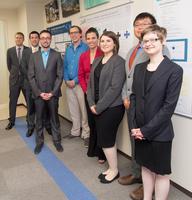Cultural Collisions: Science Engagement Through the Arts
You always wanted to know what particle physics looks like if you combine it with art? You are curious about the work and lives of physicists? Then this is the place to go!
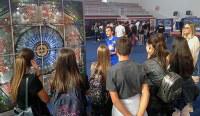
'Heroic calculation': Prof. Peltier on using new supercomputer to shed light on how oceans behave
To break in Canada’s newest, most powerful research supercomputer, the University of Toronto’s Richard Peltier is running a “heroic calculation” – one that is expected to shed new light on how the world’s oceans physically function.
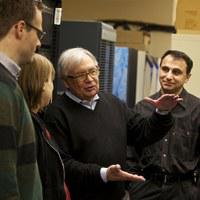
Amar Vutha - Recipient of the 2018 Sloan Fellowship
The Sloan Research Fellowships seek to stimulate fundamental research by early-career scientists and scholars of outstanding promise.
These two-year fellowships are awarded yearly to 126 researchers in recognition of distinguished performance and a unique potential to make substantial contributions to their field. The 2018 Sloan Research Fellows will receive fellowships in the amount of $65,000.
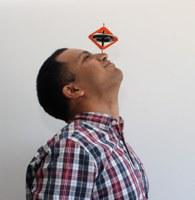
Unseen Toronto: Hidden Technologies
Filmed at U of T Physics! Watch it here.

Professor Sajeev John Appointed an Officer of the Order of Canada
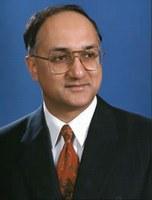
Malcolm Graham Donation of Works on Physics
Last year Professor Emeritus Malcolm Graham donated his collection of works on Physics to the Thomas Fisher Rare Book Library.

Luyi Yang named Canada Research Chair in Ultrafast Dynamics of Quantum Materials
Twenty U of T scholars, whose expertise ranges from the neural basis of music recognition to Indigenous methodologies, were named new Canada Research Chairs by the federal government this fall.

Personality types and student performance in an introductory physics course
Jason J. B. Harlow, David M. Harrison, Andrew Meyertholen, and Brian Wilson from UofT Physics and Michael Justason from McMaster have published this study in the "Physical Review Physics Education Research" magazine. Personality type is correlated with student performance in an introductory physics course.
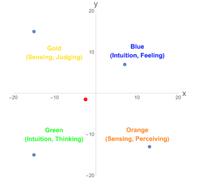
The Effect of El Nino on Atmospheric Carbon Dioxide - new research made possible by the Orbiting Carbon Observatory-2
A NASA satellite has found another thing to blame on El Nino — a recent record high increase of carbon dioxide in the air.
The super-sized El Nino a couple of years ago led to an increase of 3 billion tons of carbon in the air, most from tropical land areas. The El Nino made it more difficult for plants to suck up man-made carbon emissions and sparked fires that released more carbon into the atmosphere.

UofT theorist David Curtin featured in "Quanta Magazine"
The world’s most powerful particle accelerator, the Large Hadron Collider (LHC) at the CERN laboratory near Geneva, has failed to find any of the hoped-for particles that would lead physicists beyond the Standard Model of particle physics. But it’s possible that the LHC has been producing such pivotal new particles all along, and that we’re just not seeing them.
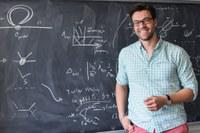
U of T Physics Climate Change Scientists Fight to Save PEARL
Without funding, atmospheric research station at Eureka, Nunavut, set to be mothballed in the spring
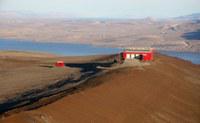
Is the Force with Us? Our Professor Aephraim Steinberg helps explain in Through the Wormhole!
Professor Steinberg was filmed for a segment in season 8, episode 1 of Through the Wormhole. A show on the Discovery Channel that is hosted by Morgan Freeman.
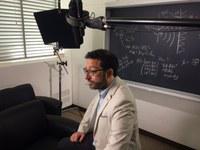
The 2017 CAP/DCMMP Brockhouse Medal is awarded to Yong-Baek Kim
The Canadian Association of Physicists (CAP) is pleased to announce that the 2017 CAP/DCMMP Brockhouse Medal is awarded to Yong Baek Kim, University of Toronto, for his leading work on the effects of large spin-orbit coupling on exotic ground states in geometrically frustrated and highly correlated quantum materials.

Former graduate student, Feihu Xu recognized by the International Organization of Chinese Physicists and Astronomers.
Feihu Xu is a former graduate student of Professor Hoi Kwong Lo and he has been named a co-winner of the inaugural Outstanding Dissertation Award (ODA) by the International Organization of Chinese Physicists and Astronomers.

U of T Physics Alumni Zen Mariani is now among 32 candidates shortlisted in the CSA's Astronaut Program
Zen Mariani was featured on CTV news on March 13, 2017 talking about his experiences during the selection process for the Astronaut Program.

U of T physicists discovered a way to increase the resolution of microscopes and telescopes
University of Toronto researchers have found a way to increase the resolution of microscopes and telescopes beyond long-accepted limitations by tapping into previously neglected properties of light.
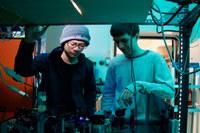
Graduate Student Madeleine Bonsma-Fisher among this year's NSERC award recipients
We go to the gym, count calories and take our vitamins — all in an effort to stay fit and avoid getting sick. But are we actually healthy? Our bodies are filled with bacteria and viruses that attack them, known as phages. Some of these tiny organisms float harmlessly along while others are ticking time bombs that could cause infections, diseases and even obesity. This microscopic community, called the “microbiome,” is unique to each person, and diversity and adaptation among bacteria and phages make it difficult to say for certain what a healthy microbiome looks like.
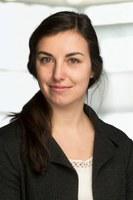
U of T Physics alumni shortlisted in the CSA's astronaut selection process!
U of T Physics alumni continue to do great things. 3 graduates are among the 72 candidates shortlisted for the Canadian Space Agency's astronaut selection program.

Certainty with complex scientific research an unachievable goal: U of T study by David Bailey
Physics professor says study can help researchers better analyze their data and encourage more realistic expectations by both scientists and the public about the accuracy of scientific research

Prof. Hoi Kwong Lo and Prof. Joyce Poon show a quantum key distribution experiment with a silicon chip transmitter for the first time.
The work demonstrates the potential of using silicon photonics to dramatically lower the cost of quantum key distribution and bring it to the mass market in future.

A new heart for ATLAS - with help from Professors Richard Teuscher and Robert Orr
The world’s largest, most powerful, and most famous particle accelerator is getting a new heart, thanks to a collaboration between our very own Professors Richard Teuscher and Robert Orr and the Canadian arm of global manufacturer Celestica Inc.
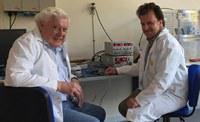
Aephraim Steinberg named Fellow of the Royal Society of Canada
U of T Physics Professor Aephraim Steinberg among 8 University of Toronto researchers named fellows of the prestigious Royal Society of Canada.
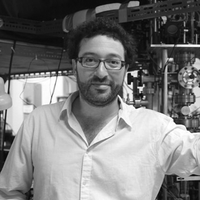
T2K Presents First Comparison of Neutrino and Antineutrino Oscillations
University of Toronto physicists are key participants in findings reported by the T2K collaboration on a comparison of neutrino and antineutrino oscillations. Such comparisons between particles and their antiparticle counterparts are sensitive to violation of “CP symmetry”, differences in the behavior of matter and antimatter.

Effective student teams for collaborative learning in an introductory university physics course
In this study publised by Physical Review Physics Education Research Jason Harlow, David Harrison, and Andrew Meyertholen studied the types of student teams that are most effective for collaborative learning in a large freshman university physics course.

Canada's Minister of Science greets T2K during visit to Japan
Canadian and Japanese collaborators present the Belle II and T2K experiments, tour the KEK Experimental Hall, and officially open the TRIUMF/KEK office with Dr. Duncan
